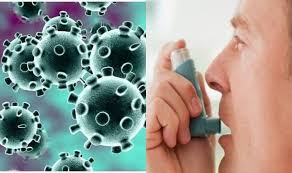
Prof. Arzu Yorgancioglu, Chair of European Respiratory Society’s (ERS) Advocacy Council, said, “For people who have respiratory conditions such as asthma, the Covid-19 outbreak is understandably a very big cause of concern”. Covid-19 in itself is a respiratory related disease that attacks the lungs and may trigger asthma symptoms like wheezing, chest tightness and difficulty in breathing. These features tend to have increased the distress and anxiety levels of the asthma patients. But, is it really a matter of concern?
1. No evidence
Currently, there are no evidences that suggest an increased rate of coronavirus infection in asthma patients. Studies from the United States and China have showed that, the proportion of asthma patients visiting hospitals of Covid-19 was less. The Centers for Disease Control and Prevention states that, the moderate to severe asthma patients could be at the higher risk of the SARS- CoV-2 infection, which is the Covid-19 virus. Till recent, risks of Covid-19 depend on lot more than, whether one has asthma or not.
2. Continue medication
Use prescribed medicines as instructed by your healthcare doctor. Inhaled corticosteroids usage can effectively prevent asthma symptoms and reduce the expression of ACE-2. ACE-2 is a type of molecule that sits on the surface of the lung cells which has been identified as the entry point that allows SARS- CoV-2 to entry the cells. Don’t stop any medications without consulting to your healthcare provider. Stopping a controller medication can put the asthmatics at risk of developing an asthma exacerbation. So, if you keep your asthma under control then your lungs will be prepared to defend against any infection or allergen. Buy medicines, health products online, as prescribed by your healthcare providers. One can also search like, ‘medical store near me with home delivery’ and avail their medicines or steroid inhalers.
3. Oral corticosteroids
Jamie Boyce, University of Oxford, has mentioned in an article that, people prescribed with oral corticosteroids, which is a type of asthma medication, have higher risks of Covid-19. But, it doesn’t mean oral corticosteroids themselves increase the risk of Covid-19.
4. Avoid hospital visits
Don’t rush to the hospitals if there is no serious problem. Dial your doctor and update on your condition. Never visit your doctor without prior appointment. Patient might have the chances of infection when provided with nebulizers at the healthcare, through which SARS- CoV-2 can be transmitted.
5. Follow Asthma Action Plan
The Asthma Action Plan recommended by respective doctors should be followed by asthmatics. Don’t change this plan without talking to your doctor.
6. Keeping clean
Wash your inhalation devices frequently. Inhalers shouldn’t be shared with others. Wash your hands regularly with soap or alcohol- based hand sanitizer. Use warm water to clean your palm.
7. General rule
It is advisable to minimize face to face interaction. Keep sufficient stock of food, medicines and necessary household essentials.
8. Distancing from sick people
Keep yourself away from people who are sick. Avoid crowds when you move out in public.
9. Emotional control
Be cautious to avoid strong emotions as it can trigger asthma attack. It is very natural and a common tendency to worry about the spread of disease in the pandemic. But, maintain emotional stability and help yourself to cope with stress and anxiety.
10. Statistics
Nearly 339 million people around the world are living with asthma. In India, chronic respiratory conditions are a serious health problem as, around 37 million are asthmatics. The country alone contributes up to 11.1% of the global asthma, paving way to over 42% related deaths. But, the complete respiratory health sector will support the patients and reassure that there following simple actions of precautions will continue to protect their health conditions.
Stop living by the dilemma of being infected by SARS- CoV-2. The above mentioned facts might help you channelize your routine and provide you some relief over your worries. But, remember that pandemic is an evolving factor and there can be an additional information on the same happening in future. The research study on the relationship between Covid-19 and asthma is still at the naïve stage and no specific data to prove either way of hypothesis is not available. Though, take care of yourself with necessary precautions to further prevent any infections.

 Log in with Facebook
Log in with Facebook 





